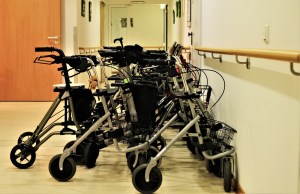 Walkers at a nursing home. Photo via Pixabay
Walkers at a nursing home. Photo via Pixabay
No matter how complex their health or mobility challenges, every older adult deserves to be treated like the vibrant individual they are and have their wishes respected. For nearly 90% of people aged 55 and older, this means retaining their independence and staying in their own homes.
However, many factors, such as a fall or a lack of support network, may sadly force an older person to move into a congregate setting like a nursing home. As we saw during the COVID-19 pandemic, these are often not the ideal care setting for fragile seniors. In fact, residents of these facilities died at a rate three times higher than their counterparts who stayed in their own homes through a better, different option for aging in place: Program of All-inclusive Care for the Elderly.
Right now, far too many seniors are unable to access innovative, cost-effective care through PACE, because income thresholds keep them from qualifying for Medi-Cal. But new rules are coming in July that will allow more people to experience the benefit of this innovative model of care.
Expanded PACE Access Saves Lives
For seniors who qualify, PACE programs like Gary & Mary West PACE in San Marcos provide coordinated, comprehensive healthcare, social services, transportation, and other support. PACE participants are 24% less likely to end up in the emergency room and experience much lower rates of hospitalizations. And, as an added bonus, PACE care costs taxpayers less than comparable programs for seniors with similar medical needs, saving the state millions of dollars.
People like J.L., a West PACE participant in San Marcos, will readily attest to the positive impact PACE has had on their lives. West PACE provides J.L. with accessible transportation to doctors’ appointments and non-emergency medical visits, as well as skilled nursing care in his home through a partnership with DocGo. Enrolling in PACE allowed him to leave a nursing facility and move back into his own home, where his family can visit more regularly—and has significantly reduced the number of times he’s needed to be hospitalized.
Unfortunately, more and more seniors exist in what we call the “forgotten middle,” unable to afford quality healthcare but also unable to qualify for assistance through Medi-Cal and enroll in programs like PACE.
That was the case for Josephine in Oceanside. After a fall forced her to move into a skilled nursing facility for a month, her daughter worked with West PACE and the Foundation for Senior Care to get Medi-Cal coverage, in order to help her to enroll in PACE and stay in her own home. It turned out Josephine was not eligible for Medi-Cal, as her assets exceeded permissible limits, even though she struggled to cover her rent and home care needs on her limited social security income. She was ordered to “spend down” her remaining assets to get coverage.
The out-of-pocket cost of care without Medi-Cal was prohibitive and proved impossible for her family to afford. A month later, Josephine died from complications resulting from her fall. Although PACE might not have cured her illness, we are confident that it would have improved Josephine’s quality of life and supported her family caregivers during the time she had left.
Spread the Word
While it may be too late for Josephine, the good news is that starting on July 1, 2022, the asset limit will increase for many Medi-Cal programs from $2,000 for individuals and $3,000 for couples to $130,000 for individuals plus $65,000 for each additional family member. Since May of this year, individuals over the age of 50 who meet financial eligibility requirements can receive Medi-Cal benefits, regardless of immigration status.
If you were previously denied Medi-Cal, consider re-applying this summer. Tell your family, friends, and other loved ones who could benefit to look at their situation and see if they could qualify for Medi-Cal and afford to enroll in PACE.
And if you’re looking for more ways to get involved, ask your members of Congress to support the PACE Expanded Act of 2022, which would lower the barriers to PACE enrollment even further, ensuring more seniors and their caregivers can access this innovative health plan.
Rena Smith is the executive director of Gary & Mary West PACE in San Marcos. She is a resident of Oceanside.
